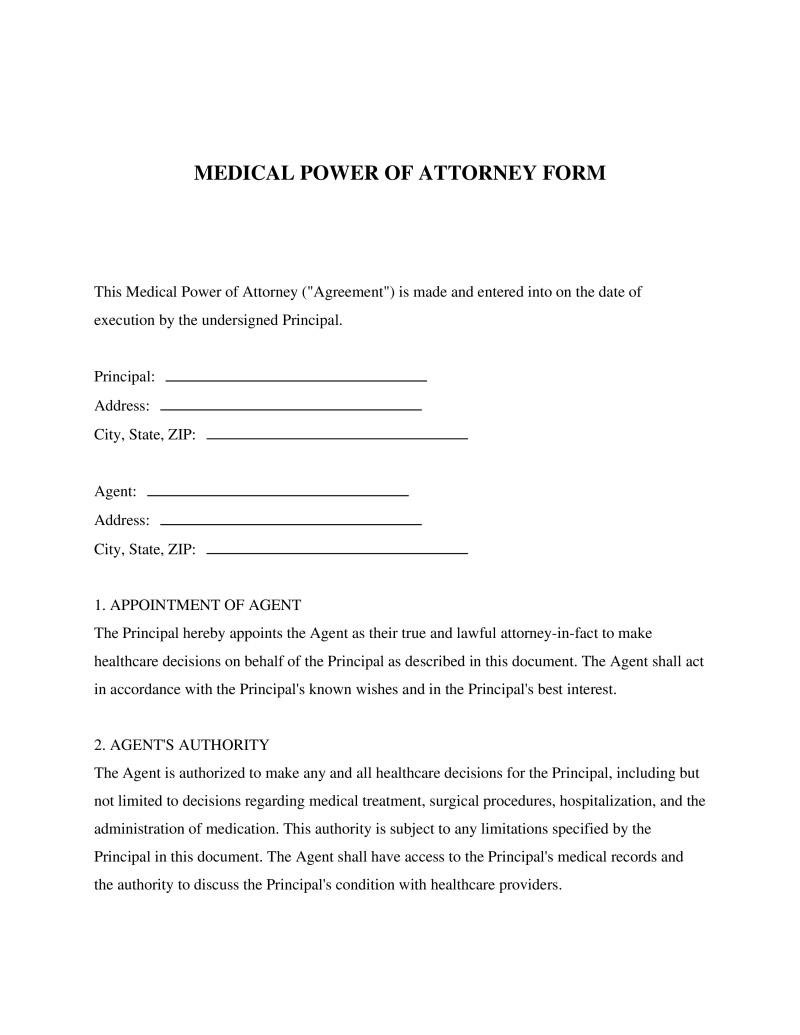What is a Medical Power of Attorney?
A Medical Power of Attorney (Medical POA) serves as a crucial legal document that enables a person, commonly referred to as the "principal," to appoint another person, known as the "agent" or "health care agent," to make health-related decisions on their behalf in the event they become incapacitated. This legal instrument is also known as a "Healthcare Power of Attorney" or "Durable Power of Attorney for Health Care."
Essentially, a Medical POA gives the agent the power to make medical decisions for the principal when they are unable to do so due to illness, injury, or mental incapacity. For instance, the agent can approve or deny specific treatments or surgeries as the principal's proxy. However, they must act in the best interest of the principal, respecting their beliefs, values, and previously expressed wishes.
Scenarios That Necessitate a Medical Power of Attorney
A Medical Power of Attorney becomes vital in situations where the principal becomes incapacitated and cannot make health-related decisions. Some scenarios include:
- After a serious accident causing physical or mental incapacity
- In cases of severe illness, like Alzheimer's or other forms of dementia
- When the principal is in a coma or unconscious for a prolonged period
Preparing a Medical Power of Attorney form in advance ensures that the principal's healthcare decisions are in the hands of a trusted individual who understands their wishes, thereby eliminating potential disputes or confusion.
Who Benefits from a Medical Power of Attorney?
While anyone can benefit from having a Medical Power of Attorney, it is particularly beneficial for individuals with advancing age, severe health conditions, or those about to undergo high-risk surgery. However, even young and healthy individuals may also consider creating one, as it provides a safety net in case of unexpected health crises.
Legal Protections Granted by a Medical Power of Attorney
A Medical Power of Attorney provides essential legal protection for the principal by ensuring their health care wishes are respected, even if they can't express them themselves. It grants the agent the power to make health-related decisions, following the principal's instructions, values, and preferences. Also, it can prevent family disputes by clearly stating who is in charge of making these decisions.
Understanding Medical Power of Attorney Through Examples
- Example 1: An elderly parent may execute a Medical POA, designating one of their children as the health care agent to make medical decisions if they become unable to do so due to age-related cognitive decline.
- Example 2: A person diagnosed with a terminal illness might use a Medical Power of Attorney to appoint a trusted friend or family member to make end-of-life decisions, ensuring their last wishes are honored.
About this document
A Medical Power of Attorney is a legal document that appoints a trusted person to make healthcare decisions on your behalf when you become unable to make or communicate those decisions yourself.
This document utilizes our advanced PassTheBar AI technology, ensuring bar-exam precision and comprehensive legal coverage.
This document is designed to comply with the laws of all 50 states.
Community Discussion
Share your experience and help others
Legal Notice: Comments are personal opinions and do not constitute legal advice. Always consult a qualified attorney for matters specific to your situation.

Comments (0)
Leave a Comment
No comments yet. Be the first to comment!